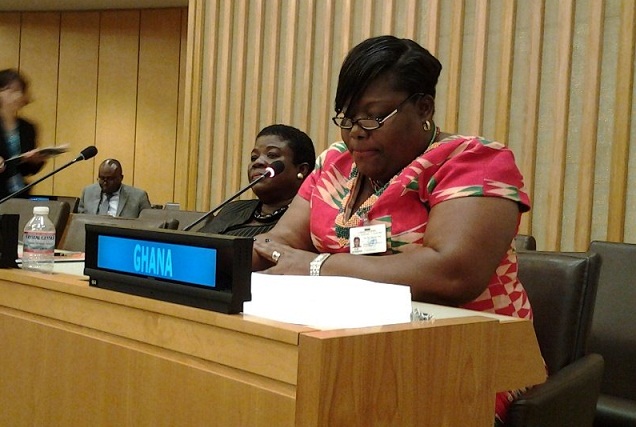
The Minister for Gender, Children and Social Protection, Hon Nana Oye Lithur at the 2014 Annual Session of the United Nations Children’s Fund (UNICEF) Executive Board.
Ghana’s traditional practices and forms of marriage took the centre stage when the country took its turn to respond to issues arising out of its sixth and seventh report on how the government had responded to the UN Convention on the Elimination of all forms of Discrimination against Women (CEDAW) at the 59th Session of the committee on the elimination of all forms of discrimination against Women underway in Geneva.
Members of the 23-member panel of experts spent a significant portion of the five-hour questioning period to probe steps taken by Ghana to harmonise all the three forms of marriage recognised by law; which are marriage under customary law, marriage under the ordinance and marriage under Mohammedan law.
The Committee also enquired why Ghana had not finalised the Legislative Instrument to operationalise the implementation of the Domestic Violence law and asked the country to provide a time frame as to when this will be done.
Other questions centred on what was being done to address some of the harmful cultural practices, with particular emphasis on the number of prosecutions, and why the country’s shelters for victims of domestic violence were all not functioning.
The high level national delegation, led by the Minister of Gender, Children and Social Protection, Nana Oye Lithur, also answered questions related to women’s rights concerning employment, education and women’s health.
Questions on the national machinery for the advancement of women, access to justice, trafficking in women and exploitation of prostitution, women’s participation in political and public life, rural women, social protection and poverty reduction were also asked.
The delegation reported that following a study conducted, the Ministry of Justice was reviewing all the laws guiding the three forms of marriages in Ghana with the view to harmonise them.
Nana Oye emphasised that any legislation on the forms of marriages in Ghana will involve a national dialogue and an integrated, long-term multi-sectoral framework.
Opening Statement
In her 30-minute opening statement to the committee, the minister emphasised that Ghana had demonstrated political will and government’s commitment to end all forms of discrimination against women.
“Ghana acceded to the CEDAW Convention in 1986, and has worked hard on implementing its principles,” the minister said.
Nana Oye indicated that the Ghana Shared Growth and Development Agenda provides the overall framework for improving the participation of women in key sectors of the economy, as well as putting in place measures to bridge the inequality gap between men and women.
“We recognise, however, the need to legislate on equality for women, in the interest of securing their fundamental human rights and to boost their essential contribution to national development,” she added.
She said the mandate of the gender machinery had been expanded; however, the budgetary allocations still remained under one per cent of the total national budget.
The minister said to strengthen the legal and policy framework on gender, the Ministry had submitted to Parliament for promulgation, the Property Rights of Spouses and the Intestate Succession Bills; and Legislative Instruments to the Domestic Violence and Human Trafficking Acts of 2005.
The Ministry is also sponsoring the Affirmative Action Bill on which consultations are currently being held, prior to its submission to the Cabinet for approval.
Access to justice
Nana Oye said women who could not afford legal fees were provided legal aid services
With regard to harmful traditional practices, the minister said the Commission on Human Rights and Administrative Justice (CHRAJ) had sustained a vigorous campaign in opposition to injurious and dehumanising cultural practices such as female genital mutilation, widowhood rites, forced marriages, ritual servitude, maltreatment of women accused of witchcraft, as well as other violent practices that subject women and girls to cruel treatment.
Furthermore, the ministry is partnering with UNICEF, with funding from The Netherlands, to address early and forced marriage in a project that will involve annual national dialogues with traditional leaders through the National House of Chiefs and the Minister of Chieftaincy Affairs.
In recent years, she added, the government had been increasingly proactive in addressing the issue of witchcraft accusations in Ghana. Particular measures taken to address the phenomenon include attempts to improve the living conditions of those accused of witchcraft and the development of a road map to facilitate the reintegration into their communities.
Participation in political and public life
To promote women’s participation in political and public life, a draft Affirmative Action Bill is currently being finalised to be submitted to the Cabinet, with an expectation that this will be concluded by the end of this year.
For the first time in Ghana’s history, there have been an unprecedented number of appointments of women to key top public offices.
“At the highest level of government, women make up 29 per cent of ministers, 23 per cent of deputy ministers, 16 per cent of chief directors and eight per cent of district/municipal/metropolitan chief executives.
The National and Regional Houses of Chiefs have also begun the process of fully integrating queenmothers into both Houses, “ Nana Oye reported.
She also made an extensive presentation on steps taken by the government to address gender issues in health, education, rural women, social protection and poverty reduction and employment.
Committee’s chairperson
The Chairperson of the Committee, Ms Nicole Ameline, said Ghana had to work hard to implement its laws.
She said the committee would make its concluding remarks and send its proposal to the country in a couple of weeks.
Source: Daily Graphic























